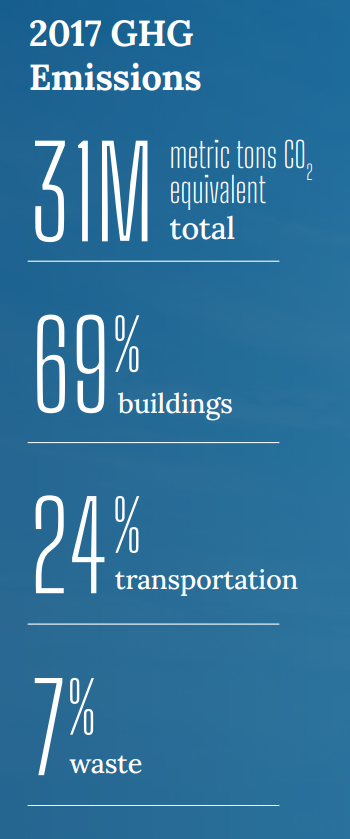Electrify Chicago
An independent tool for viewing City of Chicago building data
According to the
2022 Chicago Climate Action Plan,
69% of Chicago's emissions come from buildings, making
building emissions our biggest challenge and our biggest opportunity as a city
to tackle climate change. At Electrify Chicago, we showcase building performance using
publicly available data supplemented by community-submitted photographs and building
owners.
Start by looking at Chicago's buildings with the highest greenhouse gas intensity i.e. emissions per square foot. Large, efficient, buildings can perform much better than very inefficient small buildings on this metric.
New Article
📰 $30 Million In Missed Fines
The City Of Chicago failed to collect $30 million in potential fines from the building benchmarking ordinance, reducing transparency and accountability.
Legislative update! 🎉
As of late January 2024, legislation is being introduced to require new use more efficient forms of water and space heating, via the Clean And Affordable Buildings Ordinance (CABO), which will reduce the number of highly polluting and inefficient buildings that end up on this site.
If you're in Chicago,
write to your alderman to support the CABO!
Chicago Buildings by Greenhouse Gas Intensity
Note: Data includes large Chicago buildings with data from 2022, unless explicitly stated otherwise.
Note: This data only includes buildings whose emissions are reported
under the
Chicago Energy Benchmarking Ordinance. According to the City “As of 2016,
this list includes all commercial, institutional, and residential buildings larger than
50,000 square feet.” This dataset is also then filtered to only buildings with
reported emissions > 1,000 metric tons CO2 equivalent.
The latest year of data is from 2022, but we update the site regularly when new data is available, and some buildings may have failed to report that year, and only have older data available.
| Property Name / address | Primary Property Type |
Greenhouse Gas Intensity (kg CO2 eq./sqft) |
Total Greenhouse Emissions (metric tons CO2 eq.) |
|---|---|---|---|
|
The Paragon Chicago
1326 S Michigan Avenue
| Multifamily Housing | 5.2 kg/sqft
Lowest 28%
| 3,012 tons
Highest 14%
|
|
5427 N Broadway St
5427 N Broadway St
| Multifamily Housing | 5.2 kg/sqft
Lowest 28%
| 454 tons
Lowest 22%
|
|
4 E Elm Condos
4 E ELM ST
| Multifamily Housing | 5.2 kg/sqft
Lowest 28%
| 1,016 tons
Highest 44%
|
|
2019 - 4820 N Kedzie Ave
🕰️
4820 N KEDZIE AVE
| Senior Living Community | 5.2 kg/sqft | 312 tons |
|
Mertz Hall - CFSU-ID# 254162
🕰️
(Loyola)
1125 W Loyola Ave
| Residence Hall/Dormitory | 5.2 kg/sqft | 1,337 tons |
|
Bauer Building
230 W Huron St
| Office | 5.2 kg/sqft
Lowest 28%
| 341 tons
Lowest 12%
|
|
Chinatown Elderly
300 W 23rd St
| Multifamily Housing | 5.2 kg/sqft
Lowest 28%
| 596 tons
Lowest 33%
|
|
Enola Dew Apartments
4623 W Galdys Ave
| Multifamily Housing | 5.2 kg/sqft
Lowest 28%
| 291 tons
Lowest 8%
|
|
Parkside - 544
544 W Oak St
| Multifamily Housing | 5.2 kg/sqft
Lowest 28%
| 731 tons
Lowest 42%
|
|
Hirsch Metropolitan HS -CPS
🕰️
(CPS)
7740 S Ingleside Ave
| K-12 School | 5.2 kg/sqft | 1,134 tons |
|
Kozminski Elementary Academy -CPS
🕰️
(CPS)
936 E 54th St
| K-12 School | 5.2 kg/sqft | 527 tons |
|
Hay Community Academy, John -CPS
🕰️
(CPS)
1016 N Laramie
| K-12 School | 5.2 kg/sqft | 498 tons |
|
Mt Vernon Elementary -CPS
🕰️
(CPS)
10540 S Morgan St
| K-12 School | 5.2 kg/sqft | 429 tons |
|
Bethune Elementary -CPS
🕰️
(CPS)
3030 W Arthington St
| K-12 School | 5.2 kg/sqft | 393 tons |
|
Mayo Elementary -CPS
🕰️
(CPS)
245 E 37th St
| K-12 School | 5.2 kg/sqft | 326 tons |
Data Source:
Chicago Energy Benchmarking Data
